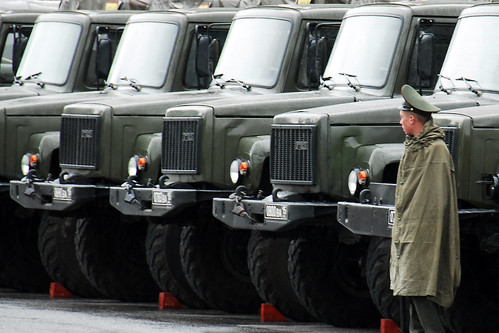 Frank Fukuyama had a very interesting op-ed in the Washington Post this weekend exploring the limits of authoritarianism. It ties in nicely with our recent discussions of nationalism and globalization. In a nutshell, he argues that, despite recent events, democracy and capitalism have no viable ideological alternatives. Modern China and Russia, he contends, are fuelled by nationalism, not a political-economic ideology like communism. Conversely, the Western combination of democratic capitalism is still winning the global war of ideas.
Frank Fukuyama had a very interesting op-ed in the Washington Post this weekend exploring the limits of authoritarianism. It ties in nicely with our recent discussions of nationalism and globalization. In a nutshell, he argues that, despite recent events, democracy and capitalism have no viable ideological alternatives. Modern China and Russia, he contends, are fuelled by nationalism, not a political-economic ideology like communism. Conversely, the Western combination of democratic capitalism is still winning the global war of ideas.Mr. Fukuyama makes some excellent points, especially about the need to evaluate states individually instead of lumping them into categories. However, I do think that he is a bit dismissive of the idea of authoritarian capitalism. His writing belies a conviction that capitalism and democracy are natural partners, and that having one without the other is impossible to sustain.
I strongly suspect that this is the case in the 30+ year outlook: it is hard to imagine the Communist Party in China being able to maintain its grip on power when the economy stops growing so rapidly, which it will at some point. However, as Mr. Fukuyama notes, the ‘Beijing Consensus’ of free markets with closed political systems is widely appealing to many developing countries. Granted, he is probably also correct in observing that it would be difficult to replicate the model in many places, particularly states in Sub-Saharan Africa which traditionally have weak, ineffective, and corrupt bureaucracies. But that won’t stop countries like Cuba from trying to emulate the Chinese model, which speaks to its ideational power. While it’s probably impossible to permanently sever the link between economic and political freedom, perhaps it will prove feasible to temporarily decouple them.
If this is the case, is this a development that should be welcomed? In situations where authoritarianism is ‘benign’, where leaders have the long-term interests of the country in mind, it could be beneficial. Centralized governments insulated from political pressure have a freer hand to implement long-term and necessary but controversial reforms. The problem is that, by virtue of human nature, there are very few enlightened despots in the world. If we concede that most leaders have ulterior motives, combined with a monopoly on the political process, authoritarianism looks like a riskier development model. It’s possible that such leaders could engineer necessary reforms and later be forced out of power as the population grows richer and demands more freedom. But it’s also possible that leaders could use the benefits of increased economic growth to primarily reinforce their own power apparatus.
In short, ‘authoritarian capitalism’ is dangerous medicine. Conversely, capitalist democracy is inefficient, because it empowers actors who might be adversely affected by necessary economic reforms and because democracies can be weak at executing coherent long-term plans. However, it has a better human rights record and is more likely to ensure political stability, which is essential for sustained development.
Which would you choose?
(Image from Tinou Bao’s flickr photostream)



No comments:
Post a Comment